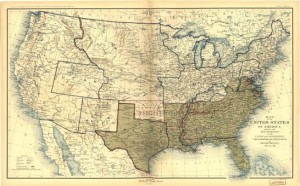 War pressures are doing strange things to some Baptists of the South. Abandoning any pretext of being faithful to the Baptist heritage of religious liberty for all, two editorials in this week’s Georgia Baptist Christian Index insist that the Confederate government govern by biblical laws regarding the Sabbath. One editorial goes so far as to mock Baptists’ traditional understanding of religious liberty, arguing instead that “soul liberty” is the domain only of Christians (and presumably Southern Christians at that).
War pressures are doing strange things to some Baptists of the South. Abandoning any pretext of being faithful to the Baptist heritage of religious liberty for all, two editorials in this week’s Georgia Baptist Christian Index insist that the Confederate government govern by biblical laws regarding the Sabbath. One editorial goes so far as to mock Baptists’ traditional understanding of religious liberty, arguing instead that “soul liberty” is the domain only of Christians (and presumably Southern Christians at that).
If running the cars on Sabbath and distributing the mail, and enforcing labor from man and beast, is an abomination in the sight of the Almighty, as doubtless it is, must we neglect to procure, if possible, a governmental recognition of God and his sovereignty, and a respect for his laws, because we must not interfere with “soul-liberty!”
“Soul-liberty,” indeed! Much connexion has soul-liberty with reform in our Post office department, and army reviews, and Sabbath transportation, and the thousand and one ways in which the government desecrates the Sabbath, thus threatening us with the chastisement of a jealous God, and, perhaps, procuring a continuance of our present calamities!
The belief that Christians should be extended special privileges by the Confederate government is increasingly evident in Southern Baptist life, the rhetoric seemingly escalating as the prospects for military victory grow dimmer.
Calls for prayer also seemingly grow during these difficult days. A third editorial in the Index calls upon Southern Baptists to pray for God’s chosen nation.
The war in which we have been engaged for more than two years, is no ordinary one. It has taxed us to the utmost in men and means. Most extraordinary exertions have to be used, and extraordinary self-denial has to be practiced in order to obtain success.–And with all this, we have again and again failed to accomplish what we desired.
In a war of such magnitude, it will not do to fold our hands, and wait for the Lord to help us. We must strain every nerve and make use of every means, God has given us. And what are the means? Guns, powder, men, horses, food, brains and bayonets.–Doubtless these are among the means that have to be used in extraordinary measure for this no ordinary war. But are these the only means to be used? Is not prayer just as much of a means of success as shot and shell? Now if shot and shall have to be used abundantly, should not prayer be used in the same way? Can we expect to succeed without the use of extraordinary means? Should we use ordinary praying in this extraordinary warfare? Does not this war as much demand extraordinary praying, as extraordinary shelling? We think there can be no difference of opinion upon such a point. And therefore we take the liberty of asking our readers, are you engaged in more than an ordinary way, in praying for your country? We do not ask whether you pray for your country; this we take for granted. But this is no war for common fighting; and this not the war for more common praying.–What we need now, is more than ordinary prayer. We pray for our country; but do we pray for it with earnestness proportionate to the importance of the war? This is our point. Such a war as this, taxing all our resources, should tax also our energies in prayer. Not ordinarily praying now: this will not do for the emergency: extraordinary prayer must be the rule of our lives if we want success. We therefore suggest to our readers, that they go by themselves once in every day and plead with God for their country; and plead earnestly; that God, for his dear son Jesus Christ’s sake, would vouchsafe us deliverance from our enemies. With all our other praying, in the family, in church, and in private, let there also be some extraordinary praying. We will not succeed unless God be on our side. He will be on our side if we ask him–if we ask him aright–both as to spirit and to zeal. This is no ordinary war and no ordinary means will carry us through it. Our soldiers have to exercise no ordinary self-denial. Should we not be willing to do the same, in praying for our country? — S. Churchman
Sources: “A Great National Sin,” “Sabbath Desecration: A Misunderstanding,” and “No Ordinary War, Christian Index, September 18, 1863


